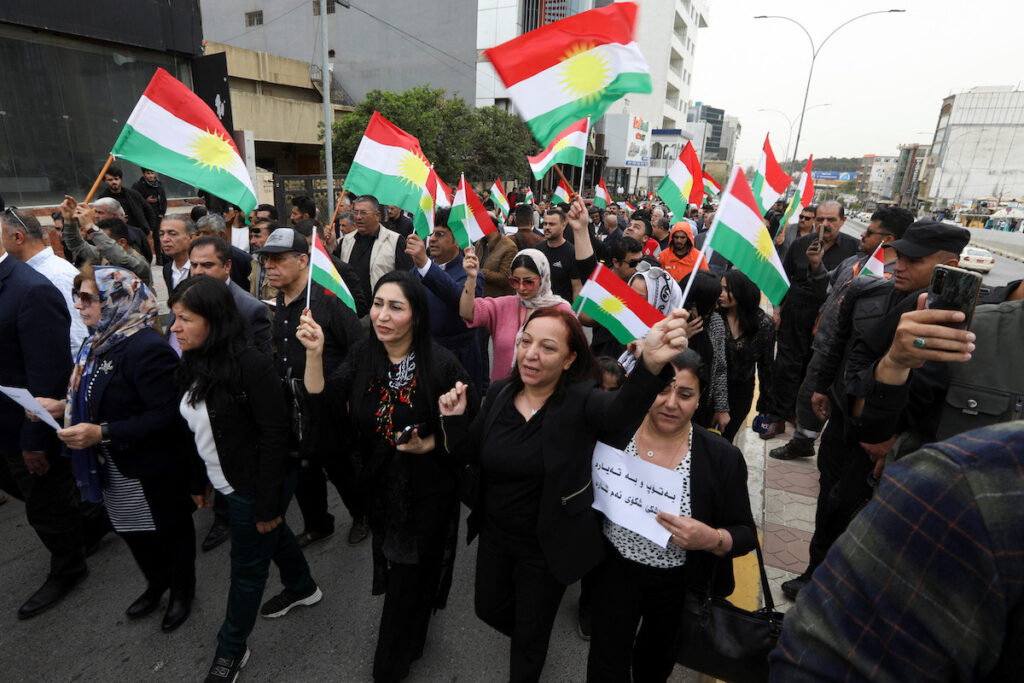The latest attempt on the life of Gen. Mazloum Abdi, head of the Syrian Democratic Forces (SDF), serves as a reminder of the ongoing battle in the Syrian Republic, as well as the nuanced alliances between Turkey, the United States and numerous regional players.
The Turkish drone attack near the Sulaymaniyah Airport in Iraq’s Kurdistan region, raises concerns about Turkey’s intentions and the wider repercussions for the conflict.
According to the Kurdish Peace Institute Research Director Meghan Bodette, there were three motivating factors for Turkey to attack.
“First, to threaten and demoralize the SDF and Autonomous Administration of North and East Syria (AANES); second, to pressure the SDF’s regional and international partners, including the U.S.-led Coalition and the Patriotic Union of Kurdistan (PUK) in Iraqi Kurdistan, to cease cooperating with them; and third, to attempt to provoke a reaction that [Turkish President Recep Tayyip] Erdoğan’s government could use to motivate nationalist voters ahead of the election.”
The SDF, a Kurdish-led coalition backed by the United States, has played a significant role in Syria’s conflict with ISIS. Turkey, on the other hand, sees the SDF as an extension of the Kurdistan Workers’ Party (PKK), which it classifies as a terrorist organization. Tensions in the region have been caused by Turkey’s concern for the PKK and the air bridge between Northeast Syria and Sulaymaniyah.
In her July 2022 article, Bodette argues that “the SDF’s cooperation with the PUK, including SDF travel back and forth to Sulaymaniyah, is no threat to Turkey or the Kurdistan Democratic Party (KDP). Instead, it is an important component of the fight against ISIS in the region, which is beneficial for security in Iraq, the Kurdistan Region of Iraq, and Turkey. Turkey’s concern is that these connections strengthen the diplomatic position of the AANES and SDF, which in turn strengthen their long-term prospects for survival.”
The risks and potential outcomes of this incident are significant, including the potential for tensions to escalate between Turkey and the U.S.
Bodette believes that “The United States needs to remain committed to preventing a new Turkish incursion into northeastern Syria in the short term and promote a just and sustainable political solution to the Kurdish question in Turkey in line with principles of democracy and international law in the long term.”
Conflict resolution in the region requires diplomacy. To achieve a peaceful settlement that takes into account the legitimate concerns of all parties, the U.S. and other international players must cooperate with all of the players. A commitment to democracy and human rights, as well as the acknowledgement of the rights of the Kurdish people, are necessary for a lasting resolution.
This struggle has been going on for years, resulting in the loss of many lives, regional instability and strained relations between Turkey and the U.S.
In fact, the conflict between the PKK and the Turkish government is as serious and relevant as the Arab-Israeli conflict, however, it is completely disregarded by the U.S.
As a NATO partner, the U.S. Biden administration has a crucial role to play in mediating a peace agreement between the two sides and, if it were to do so, could greatly contribute to regional stability and put a stop to additional violence.
Furthermore, resolving the conflict between Turkey and the PKK could have a huge impact on the situation in Syria. The PKK has ties to the SDF, which has proven to be a significant partner in the fight against ISIS and in restoring stability in Syria’s northeast.
Turkey, on the other hand, has been skeptical of the SDF and, as a result, has conducted many military operations against them.
A peace agreement between Turkey and the PKK might reduce tensions in the region and pave the way for a more stable and peaceful future in Syria. It could also help address some of the underlying factors that have contributed to the crisis in Syria, such as the marginalization of the Kurdish people and the ongoing political disputes between regional powers.
Source: All Arab News


